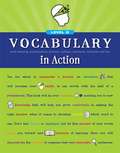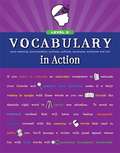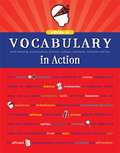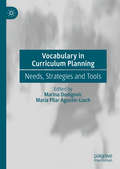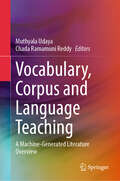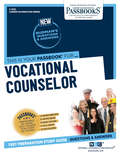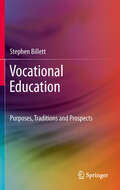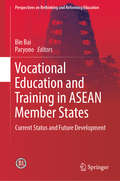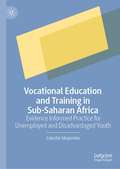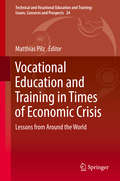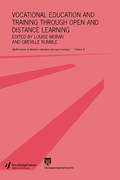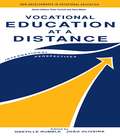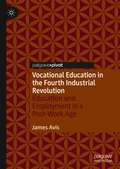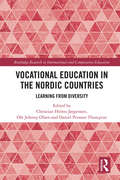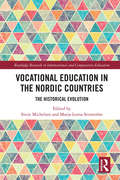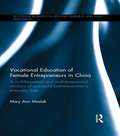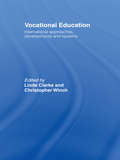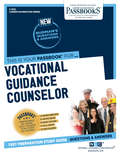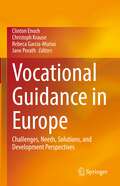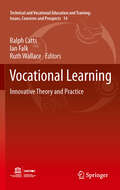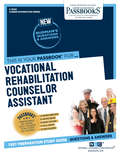- Table View
- List View
Vocabulary for the College-Bound Student
by Harold Levine Norman Levine Robert T. LevineTo provide meaningful, organized vocabulary improvement for the high school student whose goals may be college admission, a responsible position, or self-improvement.
Vocabulary for the High School Student (4th edition)
by Harold Levine Norman Levine Robert T. LevineThe principal aim of this updated and enlarged edition is to help high school students build a superior vocabulary and learn the skills of critical thinking, close reading, and concise writing. The exercises in this edition have been written expressly to teach these and other desirable skills at the same time as vocabulary.
Vocabulary in Action (Level D)
by The Editors at the Loyola PressThe book focuses on student's vocabulary development with the choice of words chosen based on frequency, occurrence, and relevance to the real world.
Vocabulary in Action (Level E)
by Loyola PressVocabulary in Action- Vocabulary Workbooks Welcome to the NEW Vocabulary in Action, the premier vocabulary development program! With this comprehensive program, students study and learn hundreds of words that were researched and selected for frequency, occurrence, and relevance to the real world as well as standardized assessment. Consumable student books pair with online resources and teacher instruction to provide vocabulary instruction that is introduced, reinforced, and applied in engaging, systematic ways. The Vocabulary in Action workbook is designed to improve oral and written vocabulary through interactive vocabulary practice, giving students the gift of a larger and more descriptive vocabulary.
Vocabulary in Action (Level H)
by Loyola PressWelcome to the NEW Vocabulary in Action, the premier vocabulary development program! With this comprehensive program, students study and learn hundreds of words that were researched and selected for frequency, occurrence, and relevance to the real world as well as standardized assessment. Consumable student books pair with online resources and teacher instruction to provide vocabulary instruction that is introduced, reinforced, and applied in engaging, systematic ways. The Vocabulary in Action workbook is designed to improve oral and written vocabulary through interactive vocabulary practice, giving students the gift of a larger and more descriptive vocabulary.
Vocabulary in Curriculum Planning: Needs, Strategies and Tools
by Marina Dodigovic María Pilar Agustín-LlachThis edited book brings together a collection of perspectives and studies on the role and potential uses of vocabulary assessment in second and foreign language learners' needs analysis. Assessing what vocabulary a student already knows - and what therefore might be a realistic goal for language learning - is an essential aspect of developing and delivering effective foreign language classes. The chapters in this book address what has so far been an under-researched aspect of classroom needs analysis, exploring the influence of vocabulary tests, the lexical profiles of teaching materials, and learner as well as teacher beliefs and practices. This book will be of interest to students and scholars of applied linguistics and TESOL, language teachers and teacher trainers, and educators engaged in assessment and evaluation.
Vocabulary, Corpus and Language Teaching: A Machine-Generated Literature Overview
by Muthyala Udaya Chada Ramamuni ReddyThis book is the result of a collaboration between a human editor and an artificial intelligence algorithm to create a machine-generated literature overview of research articles analyzing the importance of ESL/EFL vocabulary and corpus studies. It is a new publication format in which state-of-the-art computer algorithms are applied to select the most relevant articles published in Springer Nature journals and create machine-generated literature reviews by arranging the selected articles in a topical order and creating short summaries of these articles.This comprehensive book explores ESL/EFL vocabulary and corpus studies from five main perspectives: acquisition, strategies, ICT, corpus, and current practices. The sections delve into topics such as the impact of technology on learning, the power of corpora in language education, and innovative vocabulary-development techniques.This book is an essential resource for researchers, educators, and language facilitators seeking a deeper understanding of vocabulary within ESL/EFL teaching and learning contexts.
Vocabulary, Spelling, Poetry I
by James A. ChapmanWhile your child works hard at mastering the words and definitions from his spelling lists each week, this book helps reinforce the correct usage of those words. With twenty-eight weekly quizzes and four quarterly review quizzes, your child’s spelling and vocabulary skills will be evaluated and strengthened. Some of the exercises include applying spelling rules, using words in correct context, recognizing synonyms, and underlining misspelled words. You will also find eight well-known poems for recitation and memorization to enhance your child’s appreciation of poetry.
Vocal Chamber Music: A Performer's Guide
by Barbara Winchester Kay DunlapThis invaluable resource is a revised edition of an essential index to vocal works composed for at least one solo voice and one instrument (other than piano or guitar) up to twelve solo voices and twelve solo instruments. The book includes a brief introduction on how to teach vocal chamber music, with tips on running a successful ensemble. Vocal Chamber Music: A Performer's Guide, 2nd Edition is a much needed and important book for voice teachers, singers, music directors and music libraries, for information that is normally difficult to find and usually requires assembling from various sources.
Vocational Counselor: Passbooks Study Guide (Career Examination Series #C-1530)
by National Learning CorporationThe Vocational Counselor Passbook® prepares you for your test by allowing you to take practice exams in the subjects you need to study. It provides hundreds of questions and answers in the areas that will likely be covered on your upcoming exam.
Vocational Education
by Stephen BillettThis book discusses what constitutes vocational education as well as its key purposes, objects, formation and practices. In short, it seeks to outline and elaborate the nature of the project of vocational education. It addresses a significant gap in the available literature by providing a single text that elaborates the scope and diversity of the sector, its key objectives (i.e. vocations and occupations), its formation and development as an education sector, and the scope of its purposes and considerations in the curriculum. The volume achieves these objectives by discussing and defining the concept of vocational education as being that form of education that seeks to advise individuals about, prepare them for, and further develop their capacities to perform the kinds of occupations that societies require and individuals need to participate in--and through which they often come to define themselves. In particular, it discusses the distinctions between occupations as a largely social fact and vocations as being a socially shaped outcome assented to by individuals. As people identify closely with the kinds of occupations they engage in, the standing of, and the effectiveness of vocational education is central to individuals' well-being, competence and progress. Ultimately, this book argues that the provision of vocational education needs to realise important personal and social goals.
Vocational Education and Training in ASEAN Member States: Current Status and Future Development (Perspectives on Rethinking and Reforming Education)
by Bin Bai ParyonoThis book is the first monograph to systematically introduce readers to technology and vocational education and training in ASEAN countries. It details the current state of development and key development trends regarding technology and vocational education and training in the ten ASEAN countries. For each ASEAN country, the book addresses the history, status quo, characteristics, reform and development trends in technology and vocational education and training.The content mainly focuses on technology and vocational education and training systems, vocational qualification frameworks, technology and vocational education and training related personnel, etc. All the latest data presented here is drawn from the newest official website and research reports, accurately reflecting the development status of ASEAN countries and helping us make better forecasts regarding its future.This book offers a valuable reference guide for academic research in technology and vocational education and training. It can also be used as a textbook for postgraduate courses in technology and vocational education and training, as well as training material for various vocational education teachers and managers.
Vocational Education and Training in Sub-Saharan Africa: Evidence Informed Practice for Unemployed and Disadvantaged Youth
by Celestin MayombeThis book analyses the accessibility and success of vocational training programmes for unemployed and disadvantaged youth in Sub-Saharan Africa. Examining the implementation of vocational education and training programmes, the author assesses various internal and external enabling factors that can help foster youth employment. In doing so, the author presents a solid base for robust and evidence-informed practice and policy making for vocational training programmes, analysing such themes as employability skills, the labour market, and work-integrated learning. It also emphasises the importance of stakeholders taking into account the enabling and disabling environments found in a given local, regional or national context. It will be of interest to scholars of vocational training programmes in Sub-Saharan Africa and elsewhere, as well as of youth poverty and unemployment.
Vocational Education and Training in Times of Economic Crisis
by Matthias PilzThis book brings together a broad range of approaches and methodologies relevant to international comparative vocational education and training (VET). Revealing how youth in transition is affected by economic crises, it provides essential insights into the strengths and weaknesses of the various systems and prospects of VET in contexts ranging from North America to Europe, (e. g. Spain, Germany or the UK) to Asia (such as China, Thailand and India). Though each country examined in this volume is affected by the economic crisis in a different way, the effects are especially apparent for the young generation. In many countries the youth unemployment rate is still very high and the job perspectives for young people are often limited at best. The contributions in this volume demonstrate that VET alone cannot solve these problems, but can be used to support a smooth transition from school to work. If the quality of VET is high and the status and job expectations are good, VET can help to fill the skills gap, especially at the intermediate skill level. Furthermore, VET can also offer a realistic alternative to the university track for young people in many countries.
Vocational Education and Training through Open and Distance Learning: World review of distance education and open learning Volume 5
by Louise Moran Greville RumbleConventional apprenticeships and older methods of professional training are not providing enough skilled workers - governments, companies and colleges are now using open and distance learning to fill these gaps. Published in association with the Commonwealth of Learning, this unique review provides detailed analysis of worldwide experiences of vocational training and distance education. It looks at recent policy and practice at different levels - from transnational programmes and national policies to institutional and programme models. Offering guidance on how distance education and new technologies are being used to support vocational education and training, this book will help senior institutional managers and policy makers to understand and appreciate: * the role distance education can play in increasing skills levels in young people and the existing workforce* the challenges in using educational technologies, and distance education to deliver vocational education and training* how to devise effective policies to meet these challenges.
Vocational Education at a Distance: International Perspectives (New Developments In Vocational Education Ser.)
by João Oliveira Greville RumbleDrawing on case studies, this volume highlights the common problems encountered by educators who must provide vocational training at a distance from their pupils. The contributors discuss the impact of modern technology on education and consider the future role of distance education methods.
Vocational Education in the Fourth Industrial Revolution: Education and Employment in a Post-Work Age
by James AvisThis book examines the concept of the fourth industrial revolution and its potential impact on vocational education and training. Broadly located in a framework rooted in critical/radical theory, the book argues that the affordance of technologies surrounding the fourth industrial revolution are constrained by their location within a neoliberal, if not capitalist, logic. Thus, the impact of this revolution will be experienced differently across European regions as well as low and middle income economies. In order to break this impasse, this book calls for a politics based on non-reformist reforms, premised on an aspiration towards a socially just society that transcends capitalism.
Vocational Education in the Nordic Countries: Learning from Diversity (Routledge Research in International and Comparative Education)
by Christian Helms Jørgensen Ole Johnny Olsen Daniel Persson ThunqvistVocational Education in the Nordic Countries: Learning from Diversity is the second of two books that disseminates new and systematic knowledge on the strengths and weaknesses of the different models of vocational education and training (VET) in four Nordic countries. Vocational education in Europe has resisted standardisation to a higher degree than other fields of education, and during the last decade, there has been a growth in international, comparative VET research. While the Nordic countries provide an ideal case for comparative education studies, the literature in English on the Nordic VET systems is at present very limited. This book provides thorough examinations of VET in Sweden, Denmark, Norway and Finland. Each section examines the current challenges for VET, compares how these challenges are managed, and explores recent reforms and institutional innovations. Contributors also analyse institutions and policies at the national level and include comparative studies of two occupations at the micro-level in the four countries. The book explores what can be learned from the diversity of the VET systems in the Nordic countries, which otherwise have many similarities and share a common heritage in education policy. This volume will help strengthen the knowledge base required for transnational policy learning, and for developing vocational education internationally for the future. As a result, the book will be of interest to researchers, academics and postgraduate students involved in the study of vocational education, educational studies and educational policy, as well as policy makers.
Vocational Education in the Nordic Countries: The Historical Evolution (Routledge Research in International and Comparative Education)
by Marja-Leena Stenström Svein MichelsenVocational Education in the Nordic Countries: The Historical Evolution is the first of two books that disseminate new and systematic knowledge on the strengths and weaknesses of the different models of vocational education and training (VET) in four Nordic countries. Vocational education in Europe has resisted standardisation to a higher degree than other fields of education, and during the last decade, there has been a growth in international, comparative VET research. While the Nordic countries provide an ideal case for comparative education studies, the literature in English on the Nordic VET systems is at present very limited. This first book provides thorough examinations of VET in Sweden, Denmark, Norway and Finland over 150 years. Each section examines the historical evolution of VET at upper secondary level in one of the four Nordic countries. Contributors also analyse how each country have tried to reform their respective VET systems, and compare the paths which each nation has taken. The book explores what can be learned from the diversity of the VET-systems in the Nordic countries, which otherwise have many similarities and share a common heritage in education policy. This volume will help strengthen the knowledge base required for transnational policy learning, and for developing vocational education internationally for the future. It will be of interest to researchers, academics and postgraduate students involved in the study of vocational education, educational studies and educational policy, education planners and teachers educators.
Vocational Education of Female Entrepreneurs in China: A multitheoretical and multidimensional analysis of successful businesswomen's everyday lives (Routledge Research in Lifelong Learning and Adult Education)
by Mary Ann MaslakThis book examines the ways in which formal and non-formal education can contribute to women’s successful design, development and operation of small businesses in rural settings. Calling on varied, pertinent social theories, the book examines profitable businesses operated by Dongxiang Muslim women in the southern Gansu province of northwestern China. The author explains the multifaceted formula for women's challenges and successes in their business endeavours and goal for financial security. It argues that informal learning is the most important type of education to employ knowledge and skills to earn a living in general, and design and operate small businesses by women in rural areas in particular. The book concludes with an original, timely and necessary model for education that could be utilized by the women in this work; one that positions informal education as the primary conduit for successful entrepreneurial work and combines elements of both formal and non-formal educational principles and practices, thus offering support for the successful operation of women's businesses.
Vocational Education: International Approaches, Developments and Systems
by Christopher Winch Linda ClarkeVocational education and training (VET) have a key role to play in raising skill levels and improving a society’s productivity. In this important new book, a team of international experts argue that too often national VET policy has been formulated in ignorance of historical and political developments in other countries and without proper consideration of the social objectives that it might help achieve. Examining a wide range of contrasting international approaches and development strategies, this book demonstrates the central role of the state in implementing an effective system of VET and assesses the extent to which different VET policies can promote equality in the labour market and social justice. Key themes include: the broader educational and social aims of VET the nature of learning in vocational contexts the historical development of VET in the UK, US, Australia, France, Germany, the Netherlands and elsewhere. Including a full range of case-studies and practical examples, this book is essential reading for all students, researchers and practitioners with an interest in vocational education and training, industrial and labour relations or social policy.
Vocational Guidance Counselor: Passbooks Study Guide (Career Examination Series)
by National Learning CorporationThe Vocational Guidance Counselor Passbook® prepares you for your test by allowing you to take practice exams in the subjects you need to study. It provides hundreds of questions and answers in the areas that will likely be covered on your upcoming exam.
Vocational Guidance in Europe: Challenges, Needs, Solutions, and Development Perspectives
by Jane Porath Clinton Enoch Christoph Krause Rebeca Garcia-MuriasThe situation for career counselors today is particularly complex. Transformational areas such as the Corona pandemic, the climate crisis, the economic situation, and an aging population are bringing rapid changes to the demands of the labor market.This book addresses the challenges in the European labor market from the multinational perspective of career counselors. It includes multiple contributions from different countries that address the country-specific challenges that generate support and development needs for counselors. Measures, solution strategies and future forecasts are included. The contributions are based on the Academia+ project, in which a total of three online training series for career counselors from across Europe on the topics of "Counseling Migrants and Refugees," "Future Jobs," and "Demographic Change" were conducted and evaluated. The book is intended to be a guide for professionals in the vocational training field and to facilitate and support a practice-oriented initial interview from the counselor's point of view.
Vocational Learning: Innovative Theory and Practice
by Ralph Catts Ian Falk Ruth WallaceEffective knowing and learning for vocational purposes must take account of the wide range of variables that impact on knowledge formation and that promote learning. In light of those many variables, the formal sector of technical and vocational education and training (TVET) must constantly ask itself what it could and should do to better provide vocational learning for those people likely to pursue learning via the informal sector. This book addresses that question. Vocational Learning: Innovative Theory and Practice discusses four theoretical aspects of vocational learning that support understanding of vocational learning processes and practices: the situations of vocational learning; the power and roles of social networks and identity in vocational learning; knowing and knowledge management processes; and the implications for pedagogic practices in both informal and formal TVET systems. The book provides an overview of a series of international examples of innovative approaches to vocational educational theory and practice, and it draws on empirical research to analyze the effects of those approaches. It includes unique insights into aspects of TVET for Indigenous peoples. With a discussion of policy implications for Europe, North America and Australia, this book is an instrumental tool to understand the underlying factors that generate effective educational and workforce outcomes through effective formal and informal learning.
Vocational Rehabilitation Counselor Assistant: Passbooks Study Guide (Career Examination Series #C-3040)
by National Learning CorporationThe Vocational Rehabilitation Counselor Assistant Passbook® prepares you for your test by allowing you to take practice exams in the subjects you need to study. It provides hundreds of questions and answers in the areas that will likely be covered on your upcoming exam, including but not limited to; Assisting with vocational rehabilitation counseling services; Interviewing; Understanding and interpreting written material; and more.

